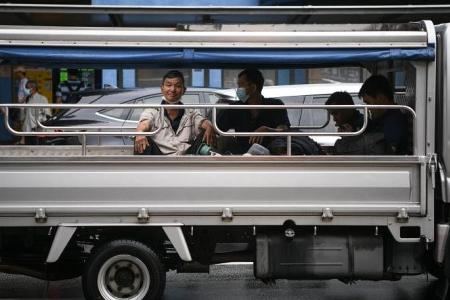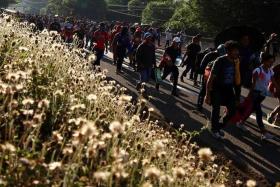Migrant worker groups urge Government for timeline to stop transporting workers in lorries
More than 40 organisations and individuals, including migrant worker welfare groups, are asking the Government for a timeline to ban the use of lorries from ferrying workers and make it compulsory for vehicles transporting people to have passenger seats and seat belts.
This renewed push for safer transport for these workers comes after 37 people - including migrant workers - were injured in two accidents involving lorries last week, according to a joint statement by these groups on Monday.
The statement - which was put up online and sent to Prime Minister Lee Hsien Loong, Acting Transport Minister Chee Hong Tat and Senior Minister of State for Transport Amy Khor - was co-signed by groups and individuals such as the Migrant Workers Centre, the Humanitarian Organisation for Migration Economics, and former NMPs Anthea Ong and Kok Heng Luen.
“While we appreciate efforts from the Government to improve the safety of workers during transportation, these recent tragic incidents have highlighted the continued grave risks posed by transporting migrant workers on lorries,” said the statement.
“Each life lost or major traumatic injury sustained represents a devastating blow to a family and community.”
The groups called on the Ministry of Transport to remove the exception in the Road Traffic Act that allows for workers to be transported in lorries, so that everyone is subject to the same passenger safety rules.
Under that Act, travelling in the back of lorries is banned unless those being ferried are employed by the vehicle owner or hirer. The other exception is in the case of medical emergencies.
Dr Stephanie Chok from migrant worker rights group Transient Workers Count Too (TWC2) called the exception “discriminatory” and “unacceptable”.
“When the lorry brakes suddenly or when there is a collision, workers fall on each other, they may fly from their seats, they may even be flung out of the lorry,” said Dr Chok, a TWC2 exco member.
“When there is equipment on board, this is even more dangerous as it may fall on workers and cause serious injuries.”
She added: “What we are asking for here is parity, not special treatment.”
New rules to improve the well-being of workers kicked in on Jan 1, which includes making it compulsory for all lorries to have rain covers, and for workers who double as lorry drivers to have at least 30 minutes of rest before driving, if they have worked six or more hours on-site.
While such rules are “strong steps forward” and address real concerns on the ground, they do not address the root cause of accidents, said the statement.
The groups said the lack of proper restraints such as seat belts increases the risk of injuries during collisions or abrupt stops, and added that the original equipment manufacturers of lorries have stated that lorries are not designed to carry passengers.
“Our workers deserve to be transported safely, as their contributions are integral to Singapore’s growth and prosperity, and their lives and continued employment are essential to their families,” said the statement.
The push for safer transport for migrant workers has been a long-standing topic of discussion and has been raised by Members of Parliament (MPs) for more than two decades.
In 2000, then-Nominated MP Gerard Ee asked if the Government would consider a ban. In 2021, the matter was brought into the spotlight after two workers died and more than were 30 injured after four lorry accidents that year.
Earlier this month, Mr Louis Ng (Nee Soon GRC) renewed a call in Parliament for the ban, suggesting that the authorities plot a road map to achieve this and implement other safety measures in the interim.
In response, Senior Minister of State for Transport Amy Khor said the Government is equally concerned about improving the safety of worker transport, but added that a ban without considering ground-level concerns is not a realistic solution, as the practice of ferrying workers in lorries cuts across industries and companies of varying sizes.
Dr Khor added then that a wider shift to mandating the use of buses will likely exacerbate an existing shortage of bus drivers, and will be challenging for smaller enterprises to employ full-time drivers.
Earlier this year, The Straits Times reported that private bus operators are struggling with a shortage of bus drivers, with many not being able to re-hire workers they laid off during the early stages of the Covid-19 pandemic, with several schools and travel agencies being affected by the shortfall.
Reception to switching from lorries to buses for ferrying workers has been lukewarm, too. Construction companies ST spoke to in 2021 said the option was not realistic, and would increase the cost per worker by as much as 80 per cent.
While acknowledging the extra costs in switching from lorries to buses, Dr Chok said there is “no morally defensible reason to continue this practice”, and that there is a need to commit to a timeline and direct resources to make the switch in the future, if human lives are indeed valued.
“Right now, workers safety and lives are treated as an externality, but these factors must be costed into the business model of hiring and transporting workers because human lives matter,” said Dr Chok.
Get The New Paper on your phone with the free TNP app. Download from the Apple App Store or Google Play Store now


